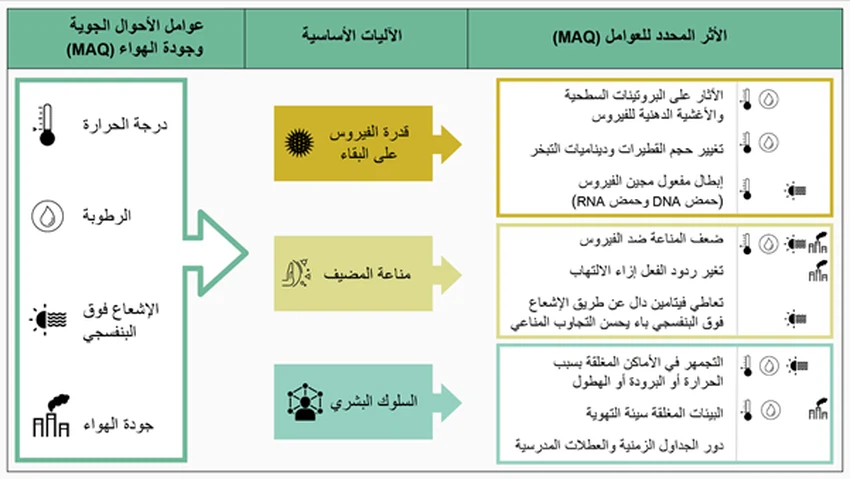Study report: Governmental interventions, not weather factors, are preventing the spread of the Coronavirus
Arab Weather - Governmental interventions, not weather factors, are preventing the spread of the Coronavirus (COVID-19) .. A WMO task force issued its first report on weather conditions and air quality factors that affect the Coronavirus (COVID-19) pandemic. ). The report warns of the use of weather and climate conditions, including the start of high temperatures in the spring season in the northern hemisphere, as a motive to relax measures aimed at stopping the spread of the virus.
The dynamics of the Coronavirus (COVID-19) transmission in 2020 and early 2021 seem to have been affected primarily by government interventions, such as imposing wearing masks and travel restrictions, rather than by weather conditions, according to the 16-member expert group on Earth and Science. Medical and public health. Other drivers include changes in human behavior and the demographic characteristics of the affected population, as well as, more recently, virus mutations.
The co-chair of the task force, Dr. Ben Zaitchik, Department of Earth and Planetary Sciences at Johns Hopkins University, Baltimore, USA, said: “The evidence currently available does not support governments' use of weather and air quality factors as a basis for mitigating their interventions aimed at reducing transmission ... We have seen an increase in waves of infection in warm seasons and in warm regions in the first year of the pandemic, and there is no evidence that this will not be repeated in the next year. "
The task force report provides a summary of the main findings published in the first week of January 2021. Therefore, it does not include the peer-reviewed literature on the impact of weather and air quality factors on the transmission of new strains of the virus (COVID-19), or on the severity. Infection caused by these new strains.
The report examines the potential role of seasonality. Respiratory viral infections are often characterized by seasonal types, especially with regard to influenza and cold-causing coronaviruses, which peak in autumn and winter in temperate climates. This supports expectations that the virus (COVID-19) will be a strong seasonal disease if it continues for many years.
The executive summary of the report indicates that "the basic mechanisms that make viral infections of the respiratory system seasonal are not well understood yet ... Perhaps there is a mixture of direct effects on the persistence of the virus, on human resistance to infection, and from the indirect effects of weather and seasons through changing human behavior." ".
According to the executive summary, “Laboratory studies of Severe Acute Respiratory Syndrome 2 (SARS-CoV-2), the virus that causes Coronavirus (COVID-19), have yielded evidence indicating that the virus persists for longer under cold and dry UV irradiation conditions. However, these studies have not yet indicated whether the direct effect of weather conditions on the virus has a significant effect on the rates of transmission of infection on the ground.
Evidence on the influence of air quality factors remains inconclusive. The task force notes that there is preliminary evidence that poor air quality increases death rates from the virus (COVID-19), but not that pollution directly affects the transmission of the virus (SARS-CoV-2), which is the cause of infection (COVID-19). -19).
The report focuses on outdoor weather and air quality conditions, and does not address the details of indoor air circulation.
The WMO Research Council has established the International Multidisciplinary Task Force to provide a quick summary of the state of knowledge regarding the potential impact of weather and air quality on the dynamics of the Coronavirus (COVID-19), given the vast number of papers and manuscripts currently available.
Professor Juerg Luterbacher, Director of the Division of Science and Innovation and Chief Scientist at WMO, noted that “the rapid pace of research on the Coronavirus (COVID-19) means that studies that rely on limited data seem to exceed the ability to cross-match and review information by. "It quickly became evident that the evidence presented was often contradictory or selective due to deficiencies in the methodology used and in the data. Therefore, the WMO Task Force seeks to favor good practices in research and communication."
The work of the task force during the coming months will include updating scientific evidence and defining an organized set of priority research issues, goals, and priorities, in order to direct investment in research related to the link between climate, weather and air quality on the one hand, and epidemics on the other hand.
The task force will also provide advice and information on good practices and minimum standards for integrated modeling methods for infectious diseases, taking into account environmental determinants, and will also make recommendations on how WMO activities in the future should take into account the correlation between Coronavirus, climate, weather and air quality when providing research information.

Examples of suggested mechanisms by which weather and air quality (MAQ) factors influence respiratory viral infection
Arabia Weather App
Download the app to receive weather notifications and more..



